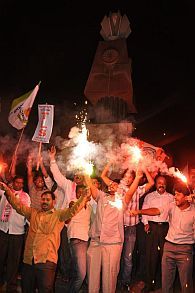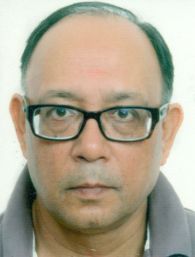 Harsh Sethi, consulting editor of Seminar magazine, is an analyst who is always lucid and sharp in his commentaries on human rights and development and issues related to politics or nation building. In a rare interview to rediff.com’s Sheela Bhatt he spoke on the broader issues related to Congress party’s endorsement to a separate Telangana state.
Harsh Sethi, consulting editor of Seminar magazine, is an analyst who is always lucid and sharp in his commentaries on human rights and development and issues related to politics or nation building. In a rare interview to rediff.com’s Sheela Bhatt he spoke on the broader issues related to Congress party’s endorsement to a separate Telangana state.
What is your take on the creation of Telangana? Do you agree or disagree with it?
I am not sure if your question is well posed. Agreement or disagreement with the creation of the state of Telangana has now become an issue of the past because the die is cast. What its implications will be for the state of Andhra Pradesh remains extremely uncertain because they have let the issue fester for far too long.
The different sectional interests for Telangana or for united Andhra have, over time, consolidated and hardened their views. In addition there are two unresolved issues which are specific to the state. One is the status of Hyderabad and other the actual boundaries of the new state that would be carved out.
In addition to these specific problems there are many general problems. The division of assets, the division of officers, the sharing of common resources and particularly sharing of water will be a major problem.
Take the two rivers, Krishna and Godavari, which run through it. Already there are major problems between Andhra, Tamil Nadu and Karnataka over sharing of waters. Now, you will have one more claimant, which will only complicate matters.
Given the time in which the debate was allowed to fester and the lack of preparation for doing it in somewhat of a more cohesive manner makes any outsider think that if and when the division comes, it will lead to a long period of turbulence and un-settlement.
The debate about smaller and larger states is desired and the issue of administrative efficiency etc including the completely unwarranted fears that redrawing of boundaries will lead to balkanisation of India. At the same time, there is no running away from the fact that every time a new state is created in India there are similar demands from other parts of the country.
In 2004, the United Progressive Alliance had initially promised it would constitute a second state reorganisation commission. It was never quite put into effect. Maybe, if they had done it at that point of time and if they had sought larger and wider consultations in terms of principles on which we seek to draw internal boundaries, then this problem would have become somewhat more manageable then it threatens to be at the moment.
Unfortunately, it was not done. No such major debate was initiated not just by the central government but also by any political group of the country. Today, what you see across the political spectrum are postures for and against Telangana but no larger cohesive arguments in terms of why they might support redrawing of boundaries and what principles they would use to redraw boundaries. Again, let us take some details.
Do you want to redraw boundaries by appealing to popular perceptions of identities whether based on religion, whether based on ethnicity or caste, language or whatever it is? Is Telangana an issue of some sense of cultural deprivation? They are in same-language grouping but is their Telugu different, which is why they are maltreated in a particular way? Is Telangana an issue of geography? These are the issues that are unresolved and un-resolvable.
In India, logically, every grouping that finds themselves carrying a perception that they are unfairly treated would like to believe that only if they have their own little territory to control they would find a better place under the sun. There is no necessary logic to argue that out.
You are not seeing the issue from the prism of the people of Telangana. Is it not the cause of celebration for them?
 I can see the issue from the point of view of those who claim to feel deprived. Let me respond from looking at the basis of other demands. We carved out the state of Uttarakhand. It was supposed to be on the basis of the hill people who are ostensibly different from the plains people. It was also the question of geography. When actually you carved the state of Uttarakhand, you don’t take away only the hill districts of Uttar Pradesh but you added the plains districts too.
I can see the issue from the point of view of those who claim to feel deprived. Let me respond from looking at the basis of other demands. We carved out the state of Uttarakhand. It was supposed to be on the basis of the hill people who are ostensibly different from the plains people. It was also the question of geography. When actually you carved the state of Uttarakhand, you don’t take away only the hill districts of Uttar Pradesh but you added the plains districts too.
Why was it done? The plains districts are the place where revenue is being generated. It is here that the industries are located. It is where agriculture is more profitable. You add these plains districts to a hill state to have fiscal viability for the new state. These regions are far more densely populated and also attract migrants and capital.
Effectively, we saw when Uttarakhand was formed the locus of power was not with the hill districts. The locus of power goes down into the plains areas. Unless you deliberately load political representation, not in terms of one-person-one-vote, for the people of hill districts by giving them more weightage by carving out more constituencies disproportionately in hill areas compared to the population of people living in the plains, the hill people will remain neglected.
People of the hill areas have to consistently and constantly outnumber people of the plains to justify the creation of a hill state. But, if you do this a few years down the line people living in the plains areas, as a part of the state, will feel politically discriminated against in the state created for the hill people.
So you will, exactly, end up with the same problem that you thought you are trying to address by creating a new state. I am not at all convinced that the mere redrawing of boundaries has both the necessary and sufficient condition for ensuring greater democratic participation and therefore superior governance policy.
I am repeating my question that from the point of view of the Telangana people…
I am saying from the people’s point of view, that they have a range of genuine problems. Their voice is not heard, that they don’t have modes of effective participation, that they are suffering from a whole range of deprivation. I am not sure of language as an issue in the creation of Telangana.
They may be Telugu-Urdu or they may be Telugu-Tamil or whatever inflection of language you are talking about but, I am saying, howsoever small an entity you carve out in India, you will never get in this country an entity that will be homogeneous. All entities, howsoever, carved out, will have multiplicity of identities and ethnicities.
What today we complain about as a minority, in terms of neglect and deprivation from someone else who constitutes a majority, will soon become a situation which will become evident in our own territoriality. Soon, they will be our own minority who will feel they are not treated fairly in a new state. It is already seen in the debate on Telangana.
Images: (top) Supporters of Telangana celebrate on Wednesday. Photograph: SnapsIndia ' (Below) Harsh Sethi
READ PART TWO: 'Telangana must not become a prisoner of provincialism, xenophobia, strife'











 © 2025
© 2025